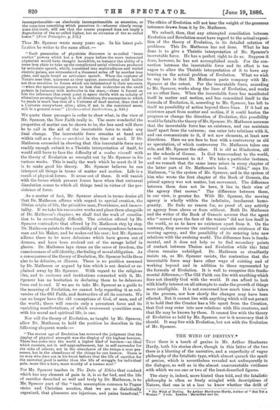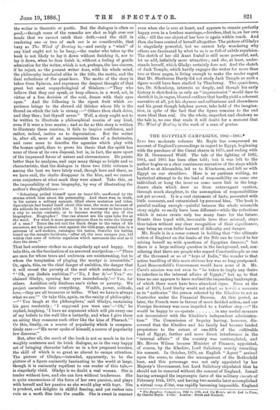THE WIND OF DESTINY.*
THAT there is a touch of genius in Mr. Arthur Sherburne Hardy, both his stories show, though in this latter of the two there is a blurring of the narrative, and a superfluity of vague philosophy of the fatalistic type, which almost quench the spark of genius, which is nevertheless revealed not nnfrequently in the dialogue, as well as in the almost unaccountable vividness with which we see one or two of the least-described figures.
The story is, indeed, more hinted than told, and the fatalistic philosophy is often so freely mingled with descriptions of Nature, that one is at a loss to know whether the drift of
• The Wind of Destiny. By Arthur Sherburne Hardy, Author of " Bat Yet a Woman." 2 vole. Loudon : Macmillan and Co.
the writer is theoretic or poetic. But the dialogue is often so good,—though some of the remarks are shot so high over our heads that we cannot catch their drift,—and the skill in rendering one or two of each sex is so considerable, that hazy as The Wind of Destiny is,—and surely a "wind" of any kind ought not to be hazy,—the reader who takes up the book is not likely to lay it down without finishing it, nor to lay it down, when he does finish it, without a feeling of gentle admiration for the writer, which is not, perhaps, the less sincere, if he reject, as the present writer does, with his whole mind, the philosophy inculcated alike in the title, the motto, and the final reflections of the quasi-hero. The motto of the story is taken from Spinoza, and expresses the deepest thought of that great but most unpsychological of thinkers :—" They who believe that they can speak, or keep silence, in a word, act, in virtue of a free decision of the soul, dream with their eyes open." And the following is the ripest fruit which ex- perience brings to the shrewd old thinker whose life is the thread on which the tale is strung :—" Others thou shalt drive, and they thee ; but thyself never." Well, a story ought not to be written to illustrate a philosophical maxim of any kind, even if it were a true maxim ; and so far as this story is written to illustrate these maxims, it fails to inspire confidence, and rather, indeed, incites us to depreciation. But the writer is, after all, more of an impressionist than of a doctrinaire, and cares more to describe the agencies which play with the human spirit, than to prove his thesis that the spirit has none of these at its own disposal, but is, in fact, the mere sport of the impressed forces of nature and circumstance. He paints better than he analyses, and says many things so bright and so characteristic, that the dialogue in these two little volumes is among the best we have lately read, though here and there, as we have said, the shafts disappear in the blue, and we cannot even conjecture at what mark they were aimed. Take this, on the impossibility of true biography, by way of illustrating the author's thoughtfulness :—
" Schonberg prided himself upon an inner life, unaffected by the storms which beat about his personality. And there was, in truth, in his nature a solitary summit, lifted above mutation and tides. Speculation had busied itself about this man, the more so because of the solitude he carried with him. It is not necessary to have taken a city to excite curiosity, or to become worthy the pen of the biographer. Biographer ! One can almost see his eyes take fire at the word. For what is more presumptuous than to write the history of a man ? Trace the red and the black drops to the veins of his ancestors, set his portrait over against the title-page, strand him in a universe of self-seekers, catalogue his tastes, describe his habits, hoard up the meagre incidents,—after all, the man escapee you, hid within that zone of infinite repulsion which surrounds the soul as it does the atom."
That last sentence strikes us as singularly apt and happy. Or take this, on the fascination of an assumed martyrdom :—" There are men for whom tears and embraces are uninteresting, but to whom the temptation of playing the martyr is irresistible." Or, again, this, on the chief danger of ambition, the danger that it will reveal the poverty of the soul which entertains it :—
" Oh, you disdain ambition ?'—' No, I fear You!' ex- claimed Gladys, opening her eyes incredulously.'—' Yes, for others. Ambition only discloses one's riches or poverty. We project ourselves into everything. Wealth, power, solitude, love,—they are all treasures or trifles. What we have is always what we are.'" Or take this, again, on the vanity of philosophy : —" You laugh at the philosophers,' said Gladys, sustaining his gaze resolutely ; I supposed you were one.'—' Oh,' he replied, laughing, have an argument which will pin every one of my beliefs to the wall like a butterfly, and when I give them an airing they consume each other like the kine of Pharaoh.' " Or this, finally, on a source of popularity which is compara- tively rare :—"He never spoke of himself, a source of popularity few discover."
But, after all, the merit of the book is not so much in its few weighty sentences and its brisk dialogue, as in the very happy art of bringing character before us in a few pregnant touches, the skill of which is so great as almost to escape attention. The picture of Gladys,—intended, apparently, to be the picture of a figure eminently fascinating to the world at large, though it is eminently repellent to one reader of this tale,— is singularly vivid. Gladys is no doubt a real woman. She is tender without love, and she can love without tenderness. She is quite unconscious of the force of her own passion, and plays with herself and her passion as she would play with toys. She is prudent, and delights in skilful fencing, and yet rushes into rain as a moth flies into the candle. She is sweet in manner even when she is sore at heart, and appears to remain perfectly happy even in a loveless marriage,—loveless, that is, on her own side,—till the one object of her love is again within reach. And then she loses control of herself altogether. The picture of Gladys is singularly powerful, but we cannot help wondering why others are fascinated by what to us is so full of subtle repulsion. The sketch of her old Aunt Isabel is still more powerful, and, let us add, infinitely more attractive ; and she, at least, under- stands herself, which Gladys certainly does not. And the sketch of Jack Temple, which hardly engages the writer for more than two or three pages, is living enough to make the reader regret that Mr. Sherburne Hardy did not study Jack Temple as such a figure would have been studied by Thackeray. The quasi-hero, too, Dr. Schonberg, interests us deeply, and though his early history is sketched-in as only an " impressionist " would dare to sketch it in, in vague, blurred outlines that hardly yield a coherent narrative at all, yet his shyness and solitariness and shrewdness and his great though helpless power, take hold of the imagina- tion, in spite of the fact that the figure remains to the end more ideal than real. On the whole, imperfect and shadowy as the tale is, no one that reads it will doubt for a moment that The Wind of Destiny is the work of a man of genius.





































 Previous page
Previous page